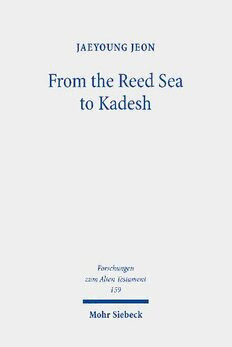
From the Reed Sea to Kadesh: A Redactional and Socio-Historical Study of the Pentateuchal Wilderness Narrative PDF
Preview From the Reed Sea to Kadesh: A Redactional and Socio-Historical Study of the Pentateuchal Wilderness Narrative
Forschungen zum Alten Testament Edited by Konrad Schmid (Zürich) · Mark S. Smith (Princeton) Andrew Teeter (Harvard) 159 Jaeyoung Jeon From the Reed Sea to Kadesh A Redactional and Socio-Historical Study of the Pentateuchal Wilderness Narrative Mohr Siebeck Jaeyoung Jeon, born 1972; 2004 MA from The Hebrew University of Jerusalem, Rothberg International School; 2012 PhD from Tel Aviv University; since 2013 SNSF Senior Researcher at the Université de Lausanne. ISBN 978-3-16-161216-9 / eISBN 978-3-16-161217-6 DOI 10.1628/978-3-16-161217-6 ISSN 0940-4155 / eISSN 2568-8359 (Forschungen zum Alten Testament) The Deutsche Nationalbibliothek lists this publication in the Deutsche Nationalbibliographie; detailed bibliographic data are available at http://dnb.dnb.de. © 2022 Mohr Siebeck Tübingen, Germany. www.mohrsiebeck.com This book may not be reproduced, in whole or in part, in any form (beyond that permitted by copyright law) without the publisher’s written permission. This applies particularly to repro- ductions, translations and storage and processing in electronic systems. The book was typeset by Martin Fischer in Tübingen using Times typeface, printed on non- aging paper by Gulde Druck in Tübingen, and bound by Buchbinderei Spinner in Ottersweier. Printed in Germany. For my mother and in memory of my father Preface The basic frame of this book was formulated through my postdoctoral project “Composition and Redaction of the Wilderness Narratives (Exod 15:22–18:27; Num 10:11–20:29) in their Pentateuchal and Hexateuchal Contexts.” The project was initiated by Prof. Thomas Römer, who invited me to join him in Lau- sanne, and was generously supported by the Swiss National Science Foundation (SNSF). Although the project period ended already in 2017, I have continued working on expanding the scope from a literary-historical analysis to encompass both studies of the socio-historical context of Persian Yehud and the literary pre- history of the wilderness narrative. The broadened scope required more time to complete the monograph but brought a few further important perspectives about the formation history and meanings of the wilderness tradition. Thus, it was worth the extended time that I invested in this subject, while working in parallel with another SNSF project on Chronicles and the Priestly literature. As ancient scribal works on major traditions were enabled by the collective efforts of a community, so are our academic works also produced collectively through scholarly interactions and support in our academic community. Ac- cordingly, I am very much indebted to many colleagues for the publication of this monograph. First of all, I am deeply grateful for Prof. Thomas Römer, who invited me to work on this subject. Throughout my time working in Lausanne, he has been an inspiring mentor, good friend, and even like family. His consis- tent practical, mental, and emotional support and encouragement have enabled me to move forward in my academic carrier. I also appreciate the members of L’Institut romand des science biblique (IRSB) and Faculté de theologie et de sciences religions (FTSR) at the University of Lausanne for their support and academic exchanges. I would like to express my gratitude to Prof. Konrad Schmid, who has always been supportive, even since my Ph.D. Regarding this publication in particular, he accepted the manuscript to the prestigious series Forschungen zum Alten Testament and accelerated the process in kind consideration of my situation. I appreciate also Prof. Eckart Otto and Dr. Peter Altmann for reading the manu- script and kindly commenting on it. My special thanks go to John Will Rice, my English editor. From the early stage of drafting the manuscript to the post-typeset corrections, he helped me so effectively, consistently, and willingly. When writ- ing in a language other than one’s mother tongue, the quality of the publication’s VIII Preface language is often highly dependent on the language editor. John Will has been accompanying me in recent years as a reliable editor. I would also appreciate the efficient work of Bettina Gade, Markus Kirchner and their colleagues at Mohr Siebeck who handled my manuscript. My family has always been my main source of strength. I am grateful for Eunshim, who has always been so supportive, and for Hajin and Yeju, who keep me alive. Lausanne, July 7, 2022 Jaeyoung Jeon Table of Contents Preface ..................................................... VII Abbreviations ............................................... XV I. Introduction .............................................. 1 1. Pentateuchal Formation Models and the Wilderness Narrative .... 3 1.1. The Views based on the Classical Documentary Model ...... 3 1.2. The Newer Models ................................... 6 1.2.1. Two-Layer Models .............................. 6 1.2.2. Complex Models ............................... 7 1.3. Structural Studies .................................... 13 2. Scope, Formation Model, and Methodology in This Study ....... 15 2.1. Scope of the Study ................................... 15 2.2. Methodology ....................................... 17 2.3. Literary Layers and the Formational Model in This Study .... 20 2.4. Structure of This Study ............................... 22 II. Early Traditions in the Wilderness Narrative .................... 25 1. Some Early Traditions in the Wilderness Narrative ............. 25 1.1. A Strange Route from Egypt to Canaan ................... 25 1.2. A Sacred Mountain and Yhwh in the South ................ 27 1.3. The Detour and the Transjordanian Traditions ............. 30 1.3.1. The Conquest of Transjordan by Northern Israel ....... 31 1.3.2. Eastern Origins of Israel? ......................... 35 1.4. Early Versions of the Wilderness Narrative ................ 44 1.4.1. The Southern Desert and Transjordan ............... 44 1.4.2. Inclusion of the Kadesh Tradition .................. 45 1.4.3. A “Proto” Exodus-Wilderness Narrative ............. 48 2. The “First” and “Second” Wildernesses Journey ............... 50 2.1. A Late Monarchic Version ............................. 50 2.2. The “Second Exodus” and the “Second Wilderness Journey” .. 52 2.3. The Second Wilderness Journey, Economy, and the Persian Policy ............................................. 55
